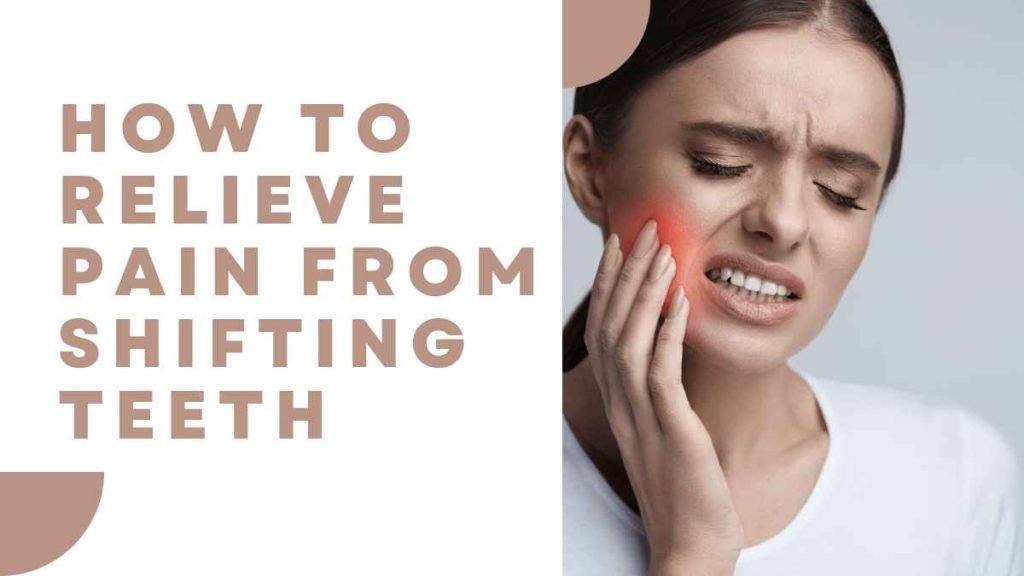How to Relieve Pain from Shifting Teeth! If you’ve ever experienced the discomfort of shifting teeth, you know it can be a real pain – literally. But fear not, because understanding why this happens and knowing how to relieve the associated pain can make a significant difference in your oral health and overall well-being. In this comprehensive guide, we will explore How to Relieve Pain from Shifting Teeth. Here we’ll walk you through everything you need to know about shifting teeth, from its causes and symptoms to effective relief methods and common mistakes to avoid. Let’s dive in!
Table of Contents
Introduction
Shifting teeth might sound like a minor issue, but it can lead to significant discomfort. Teeth, like a perfectly arranged set of dominos, can shift due to various reasons. Whether it’s due to aging, genetics, or poor oral habits, the result is the same: pain and inconvenience. But fret not, because there are ways to manage this discomfort effectively.
What Is Teeth Shifting?
Imagine your teeth as pieces of a puzzle, fitting perfectly together. When this alignment is disrupted, it leads to teeth shifting. This can happen due to natural growth, tooth loss, or external factors like accidents. Shifting teeth not only affect your smile but can cause pain and bite problems, making it essential to address the issue promptly.
How to Relieve Pain from Shifting Teeth: A Step-by-Step Guide
Here you can checkout the step-by-step guide about How to Relieve Pain from Shifting Teeth:
Total Time: 10 minutes
Maintain Good Oral Hygiene
Regular brushing and flossing can prevent gum diseases and cavities, reducing the chances of teeth shifting. Use a soft-bristled toothbrush and fluoride toothpaste for optimal results.
Use Orthodontic Appliances
Orthodontic devices like braces or retainers can help align teeth properly, reducing discomfort caused by shifting. Consult an orthodontist to determine the best option for your situation.
Over-the-Counter Pain Relief
Non-prescription pain relievers like ibuprofen can alleviate the pain associated with shifting teeth. Always follow the recommended dosage and consult a healthcare professional if pain persists.
Cold Compress
Applying a cold compress to the affected area can numb the pain and reduce inflammation. Use a cloth wrapped ice pack and apply it for 15-20 minutes at a time.
Avoid Hard Foods
Chewing on hard foods can worsen the pain from shifting teeth. Stick to a soft diet and avoid crunchy or sticky items to prevent additional discomfort.
What Are the Causes of Teeth Shifting?
Teeth shifting can occur due to several reasons, including:
Aging
As we age, our teeth tend to shift naturally. The ligaments supporting the teeth become less flexible, leading to misalignment.
Missing Teeth
The gap left by a missing tooth can cause adjacent teeth to drift into the space, leading to shifting.
Gum Disease
Gum diseases can weaken the bones supporting the teeth, causing them to shift over time.
Poor Oral Habits
Habits like teeth grinding and nail biting can exert pressure on teeth, leading to misalignment.

What Are Shifting Teeth Symptoms?
Recognizing the symptoms of shifting teeth is crucial for timely intervention. Look out for:
Pain and Discomfort
Persistent pain and discomfort, especially while chewing, can indicate shifting teeth.
Visible Misalignment
Obvious changes in your smile, such as noticeable gaps or overcrowding, suggest shifting teeth.
Changes in Bite
Difficulty in biting or a sudden change in your bite pattern can signify teeth shifting.
How to Treat Shifting Teeth?
Addressing shifting teeth involves a combination of preventive measures and professional treatments:
Dental Consultation: Schedule regular dental check-ups to monitor your oral health. Your dentist can detect early signs of shifting and suggest appropriate treatments.
Orthodontic Intervention: Orthodontic treatments like braces or clear aligners can gradually realign teeth, correcting the shifting issue.
Dental Procedures: In severe cases, dental procedures such as dental bonding, veneers, or crowns might be necessary to restore the proper alignment of teeth.
Common Mistakes to Avoid
Avoid these common mistakes to prevent or minimize teeth shifting:
Ignoring Dental Issues: Ignoring dental problems like cavities or gum diseases can weaken teeth and contribute to shifting.
Skipping Dental Check-ups: Regular dental check-ups help detect issues early, allowing for timely intervention.
Poor Oral Hygiene: Inadequate brushing and flossing can lead to gum diseases, weakening the teeth’ support structure.
Not Using Mouthguards: For individuals prone to teeth grinding or participating in contact sports, not using mouthguards can lead to misalignment.
Tips and Tricks
Practice Good Oral Habits: Brush twice daily, floss regularly, and use mouthwash to maintain excellent oral hygiene.
Wear Your Retainer: If you’ve had orthodontic treatment, wearing your retainer as prescribed by your orthodontist can prevent teeth from shifting back.
Avoid Stress: Stress can contribute to teeth grinding. Practice relaxation techniques like yoga or meditation to reduce stress levels.
Facts About Shifting Teeth
- Shifting teeth can occur at any age, not just during adolescence.
- Genetics play a significant role in the alignment of your teeth.
- Shifting teeth can impact your speech and pronunciation.
- Properly aligned teeth are easier to clean, reducing the risk of cavities and gum diseases.
Conclusion
In conclusion of How to Relieve Pain from Shifting Teeth, understanding the causes, symptoms, and treatments for shifting teeth is essential for maintaining good oral health. By adopting healthy oral habits, seeking professional dental care, and being aware of the signs of shifting teeth, you can relieve pain and prevent further complications. Remember, your smile is an essential part of who you are, so take care of it! Here you can checkout that How to Know If You Have a Cavity Between Teeth.
FAQs About How to Relieve Pain from Shifting Teeth
Can shifting teeth affect my overall health?
Yes, shifting teeth can impact your overall health. Misaligned teeth can lead to jaw pain, headaches, and even digestive issues due to improper chewing.
Is teeth shifting reversible without orthodontic treatment?
Minor shifts can sometimes be corrected without orthodontic intervention, but significant misalignments usually require professional treatment.
How long does orthodontic treatment take to correct shifting teeth?
The duration of orthodontic treatment varies based on the severity of the shifting. It can range from a few months to a few years.
Can I prevent teeth shifting after orthodontic treatment?
Wearing retainers as prescribed by your orthodontist is crucial to prevent teeth from shifting back after the treatment.
Are there natural remedies for relieving pain from shifting teeth?
While natural remedies like applying clove oil or using warm saltwater rinses can provide temporary relief, consulting a dentist for proper treatment is essential for long-term relief.
Can shifting teeth affect my speech?
Yes, misaligned teeth can affect your speech and pronunciation. Proper alignment can improve speech clarity.
Are there age restrictions for orthodontic treatments to correct shifting teeth?
Orthodontic treatments can be done at any age. Adult orthodontic treatments are becoming increasingly common, and there is no age limit for correcting shifting teeth.


